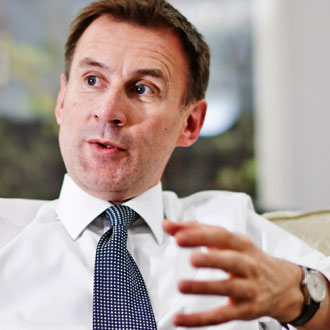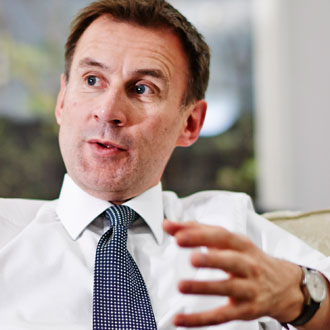
Jeremy Hunt – online
Why has it taken so long for you to commit real resources to general practice? Last year you suggested that GPs were paying ‘penance’ for the gains of the 2004 contract. Is that why?
I think we need to look at this in context – investment in general practice now is substantially higher than when I became health secretary. Under the last Government, real-terms investment actually fell – but we should acknowledge a trend of relative underinvestment in primary care that has gone on for too long. We’re determined to address that, and what we announced last month in the General Practice Forward View was an unprecedented increase in funding for general practice of an extra £2.4bn a year by 2020/21, or a 14% increase in real terms. The Government sees general practice as a big priority – I have said before that I think it is the area where the biggest change will happen in the next five years – and this is us putting our money where our mouth is.
The GP Forward View is a big step, but it does not even return general practice to the proportion of funding it had 10 years ago. Is this good enough?
The latest data show that real-terms investment in general practice is £266m higher than it was compared with 10 years previously, and has grown by 2.7% over my time as health secretary. And as I say, last month’s GP Forward View sets out plans that will see a 14% increase in this funding over the course of this Parliament – compared with only 8% for the rest of the NHS.
You have promised a new voluntary contract for GPs from 2017. Will this be funded by additional resources, or will it be paid from the funds already announced for general practice?
The general practice elements of the multispecialty community provider (MCP) contract will come from the record funding announced in the GP Forward View, but it’s important to say that other elements of the contract will be funded from elsewhere. MCPs will receive a single, integrated sum to cover the full scope of services provided to the population. Already, our MCP vanguards are making significant progress right across the country, moving people’s care out of hospitals and into communities.
Recent figures show a 2% decrease in GP numbers last year, a blow for your target of 5,000 extra GPs by 2020. Why are your attempts at increasing GP numbers failing, and what makes you think this will improve?
I’ve always been clear that recruiting and retaining GPs is an absolute priority, so I am pleased that the first round of this year’s specialty training recruitment looks very encouraging. Last month’s GP Forward View should mark a real step-change in retention too, setting out our plans to increase the numbers of doctors returning to general practice and working with the profession to make general practice more attractive by tackling big issues like burdens and workload. With government work ongoing on pensions, indemnity and tech – to name just a few areas – I think we have an increasingly positive offer to the profession.
The official evaluation of the Prime Minister’s Challenge Fund pointed out the lack of demand for routine GP appointments on Sunday. Why are you continuing to push for Sunday opening?
My job is to make sure that patients in England have access to consistent, safe and high-quality care. Expanding GP access is just one part of this because if the NHS is to continue to offer a great service we have to recognise that many people do not want to have to take time off work for a routine appointment. According to a YouGov poll in July 2015, a significant majority thinks GP surgeries should offer appointments seven days a week – but that does not mean it will be at the same level on a Sunday afternoon as a Saturday morning. So we are looking for solutions to be offered by a network of practices rather than asking every practice to open seven days a week – as happens successfully in many areas under the Challenge Fund.
The GP Forward View looks at scaling back CQC inspections, but if you were serious about reducing bureaucracy, surely these should be abolished altogether?
CQC inspections ensure that GP services are safe, effective, caring and well led, and I can’t apologise for this Government’s focus on safety and quality. I am always delighted to see practices rated ‘good’ or ‘outstanding’, but the inspection programme enables us to help those that are not yet offering a consistently high level of care to their patients. But I certainly hear the message from GPs – often expressed with vigour – that inspections must be proportionate. The GP Forward View quite rightly commits to streamlining inspections and reducing the frequency at which top-performing practices are inspected.
A major source of paperwork for GPs is annual appraisals and revalidation. Would you consider extending the interval between these exercises, say by having revalidation every eight years instead of every five?
I’m always keen to listen to ideas about how we can reduce burdens in general practice, and the current GMC review of medical revalidation is an important opportunity to consider this. But I’m clear that this needs to be balanced with ensuring that doctors are up to date with their practice and able to give patients the best-possible care.
The internal market in the NHS in England is a major headache for CCGs trying to integrate services. Should this be removed altogether?
Choice has an important role to play in improving NHS services for patients – and that isn’t a political point, because it has been the policy of successive governments for decades. But what’s even more important is quality of care, so I believe it’s local clinicians themselves who should decide on the best service provider. Choice enables a patient requiring a hip replacement, for example, to have their operation in the hospital that best suits them. Equally, cooperation is crucial in ensuring that, should the same patient require rehabilitation and support from local services after their operation, this is provided in a coordinated way. We’ve offered clear guidance to make it easier for CCGs to determine how to use their commissioning powers and have been clear that we want to see closer working between the NHS and local authorities. Practical support is available to CCGs via NHS England’s Lead Provider Framework.
What would it take for you to return to negotiations with the junior doctors?
This has been slightly overtaken by events [Editor’s note: these questions were submitted before the negotiations resumed] but I am delighted that we have been able to agree a deal with the BMA, and I give their leadership great credit for coming back to the table so we could resolve the areas of difference between us. The deal will enable us to offer better care to patients across the week, and meaningfully improve doctors’ working conditions. Junior doctors are the backbone of the NHS, and we are determined to address their concerns going forward. The contract also prioritises GP trainees, who will get a pay uplift as a shortage specialty.
What has been the biggest lesson you have learned in your time as health secretary? Do you have any regrets?
This question can be fatal for a politician. Of course there are things that I would do differently, but I think my biggest lesson would be understanding the importance of cultural change in delivering the improvements we all want. Having witnessed the work of the Virginia Mason Hospital in Seattle – perhaps the safest hospital in the world – it becomes very clear that the staff buy into a shared ethos on patient care. It must be a shared objective in the NHS to create a culture that enables staff consistently to deliver the quality of care they want to. I wish I had understood that sooner in my time as health secretary.
















